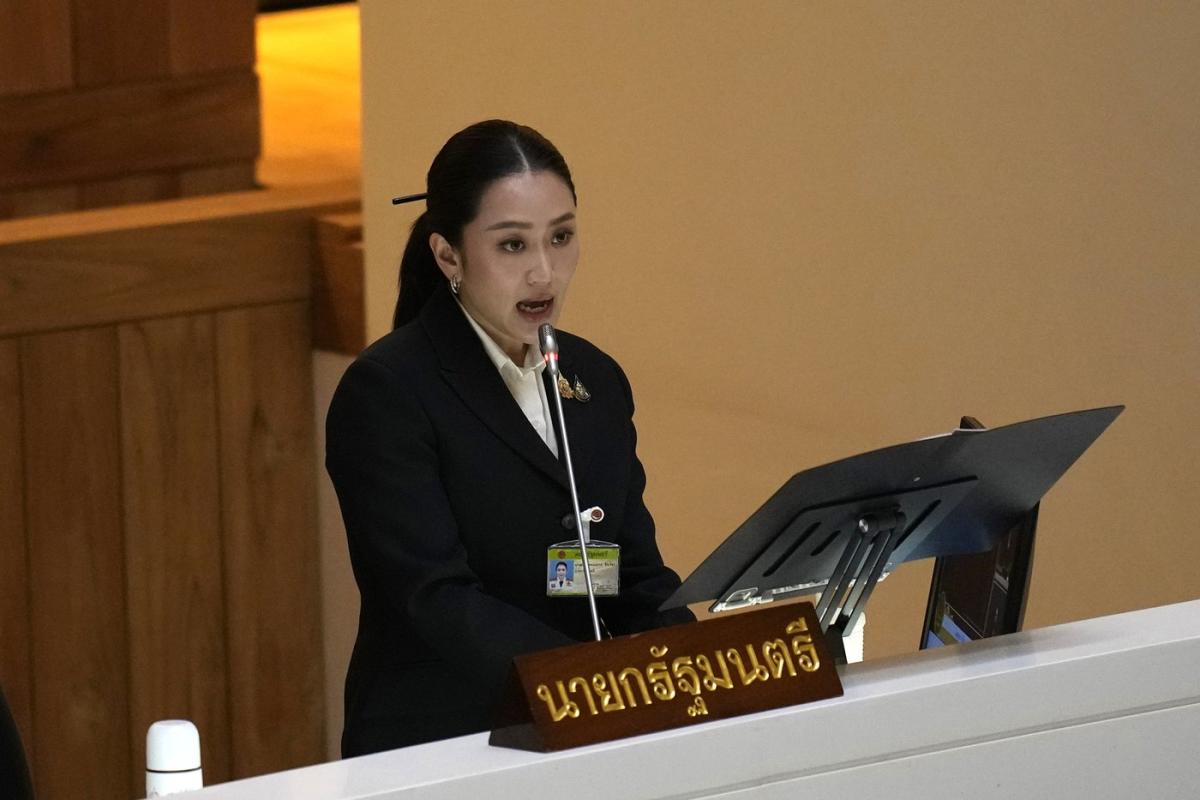BANGKOK (AP) — Thailand’s new Prime Minister Paetongtarn Shinawatra vowed Thursday in her inaugural speech to Parliament to continue many of her predecessor’s plans to solve the country’s economic woes.
Paetongtarn, the leader of the ruling Pheu Thai Party and daughter of former Prime Minister Thaksin Shinawatra, took office last month after a court ousted Srettha Thavisin from his post over an accusation that he had violated an ethics law by appointing a Cabinet member who had served time in prison in connection with a bribery case.
Pheu Thai formed a government headed by Srettha after members of the conservative Senate refused to endorse the prime minister nominated by the progressive Move Forward Party, which won the most seats in last year’s general election.
Thailand is facing several economic challenges and Paetongtarn said Thursday her government will urgently address the issues of high household debt, the rising cost of living and lagging incomes “to bring the hope of Thai people back as soon as possible.”
Among the government’s more immediate plans are measures to relieve household debt and reduce the rising cost of electricity, petrol and transport, as well as to boost tourism and bring new technologies to the agricultural sector, she said.
Paetongtarn said the government will generate new income by legalizing and taxing the “informal economy” and the “underground economy.” Although she provided no details, it was an apparent reference to plans to legalize casinos, which are being promoted as “entertainment complexes” that can attract revenue windfalls.
The draft of the law, sponsored by the Finance Ministry, says a casino would be allowed to operate within a complex that also houses other businesses such as a hotel, a convention hall, a mall or a theme park. Access to casinos will be restricted to those younger than 20 years old. They will be open for foreigners, while Thai citizens must pay 5,000 baht ($148) for an entrance fee, according to the draft.
She said the government will protect small businesses from unfair competition from foreign operators, especially on online platforms. Industry groups in Thailand have expressed increasing concern about an influx of cheap products from China that they say have hurt sales by domestic producers.
Paetongtarn said she will carry out Srettha’s 10,000-baht ($296) digital cash handout program, although details in her speech were sparse. Officials from her administration have said the “Digital Wallet” program, initially promised during last year’s election campaign to give cash handouts to all Thais aged 16 and older, will now prioritize vulnerable low-income groups. They are set to be paid a lump sum this month or by October, while others who are eligible may be paid in installments starting later this year.
In a shift from Srettha, who had vowed to make cannabis illegal again, Paetongtarn said her administration will support medical cannabis as a way to boost the economy, with regulations added to mitigate its social impact. Cannabis was decriminalized in Thailand in 2022, intended only for medicinal use, but in practice the market is virtually unregulated and there was a proliferation of retail shops catering to recreational users.
Fears of drug abuse, especially among young people, as well as concerns about health, prompted a public backlash, and during last year’s election campaign Paetongtarn’s Pheu Thai, along with other parties, pledged to restore measures to ban the drug. However, the government in July suddenly signaled it was backtracking from that pledge.
Paetongtarn said her government in the longer term will also address climate change, improve the quality of education and the universal healthcare system, and tackle political instability by drafting a more democratic constitution and reforming the bureaucratic system and the military.
The results of Thailand’s elections last year revealed a strong mandate for change after nearly a decade under military control. Reforms to the military — a powerful political player that has staged two coups since 2006 — were part of Pheu Thai’s campaign platform, although it hedged the pledge significantly after it took power and formed a government with pro-military parties.
Paetongtarn’s rise to power, which made her the country’s youngest leader and second female prime minister, represents the revival of the embattled political dynasty that began with her father Thaksin, a billionaire telecoms tycoon, who was elected prime minister in 2001 but ousted by a military coup in 2006.
She is the third close member of the Shinawatra clan to take the prime minister’s job. Thaksin’s sister, Yingluck Shinawatra, was Thailand’s first female prime minister from 2011 to 2014. An in-law, Somchai Wongsawat, also served briefly as prime minister in 2008.
Thaksin remains a highly influential political figure and is seen as a de facto leader of Pheu Thai. His apparent dominance over the party has triggered controversy, including a petition to the Election Commission accusing Pheu Thai of allowing an outsider to control it, which could result in the party’s dissolution.
After Thaksin was ousted in 2006, the military joined hands with other conservative forces in Thai society to try to thwart a comeback of his political machine. Thaksin’s ouster triggered years of struggle between his supporters and his opponents, in the streets, in the courts and at the ballot box.
Jintamas Saksornchai, The Associated Press

